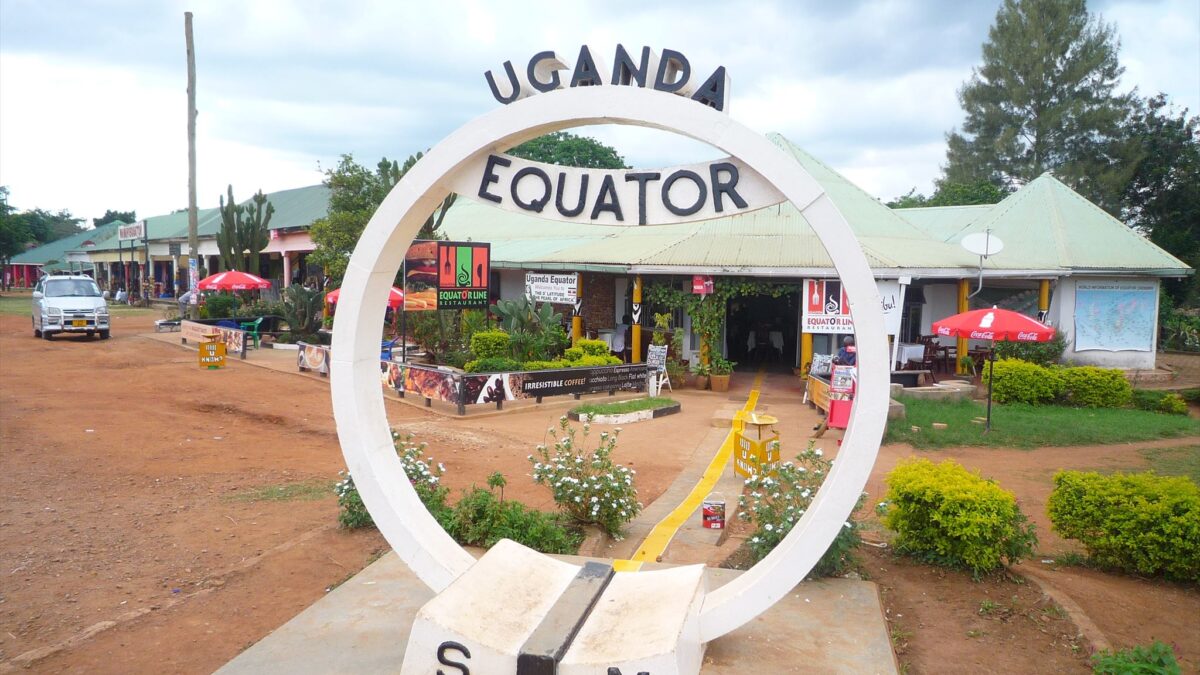Visiting Equator Line in Uganda

Fly to Bwindi & Drive to Lake Mburo National Park
February 7, 2024
Travel to Lake Bunyonyi Kabale Uganda
February 7, 2024Exploring the Equator Line in Uganda – An Unforgettable Encounter
Embarking on a journey to the equator line in Uganda is an experience that should not be missed in the heart of Africa – the Pearl of Africa. The primary destination for the equator line in Uganda is located on the Kampala-Masaka Road. Travelers exploring the western national parks of Uganda, such as Bwindi Impenetrable Forest, Mgahinga Gorilla National Park, Queen Elizabeth National Park, Lake Mburo National Park, and Lake Bunyonyi, often make a stopover at the equator. It serves as a refreshing break during their journey, offering opportunities for photos and engaging in exciting activities at the equator, including balancing an egg on a nail at the Intiman Solar Museum.
Uganda stands out as one of the few countries globally intersected by the equator. While on a safari in Uganda, visiting the equator becomes a perfect lunch stopover en-route to various destinations, adding a unique dimension to the journey. Trek Africa Expeditions ensures that your itinerary in western Uganda includes a stopover at the equator, enriching your safari experience.
Understanding the Equator: An Imaginary Line of Significance
The equator is an imaginary line drawn on the earth’s surface, dividing it into the Northern and Southern Hemispheres. At 0 degrees latitude, the equator holds a special place in geography and science. During your visit to the equator, you can stand with one foot in the southern hemisphere and the other in the northern hemisphere, a symbolic representation of the earth’s division.
An intriguing phenomenon at the equator is the effect on gravitational force. Standing with legs on different sides may make a person feel lighter due to the significantly reduced gravitational force at the equator compared to the poles. While this may create a temporary sensation of weight loss, it returns to normal upon leaving the equator, albeit with a 3 percent reduction.
Climate and Features of the Equator: A Unique Perspective
The equator experiences warm and humid climates, with consistent temperatures throughout the year and abundant rainfall, especially during the winter season. Uganda’s equatorial climate is distinct and pleasant, making it a perfect destination for exploration. The sun is directly overhead at noon, providing equal hours of daylight and night, a phenomenon resulting from the refraction of sunlight.
In addition to the gravitational effects, water behavior at the equator is noteworthy. The water runs down counterclockwise in the Northern Hemisphere and clockwise in the Southern Hemisphere, influenced by the Earth’s rotation.
The Equator in Uganda – Kayabwe: A Must-Visit Destination
Situated in Kayabwe, Mpigi District, approximately 72 kilometers from Kampala city, the equator in Uganda has become a top destination for both local and international visitors. The equator’s location is well-marked on the Kampala-Masaka road, making it a prominent stopover for travelers to and from the western region of the country.
The area around the equator features restaurants and shops offering a variety of locally crafted souvenirs. Visitors have the opportunity to purchase unique items, contributing to the support of local NGOs and their initiatives for the welfare of children.
Activities at the Equator in Uganda: A Blend of Culture and Science
Souvenir Shops and Restaurants:
Craft shops at the equator present a variety of handcrafted souvenirs, including T-shirts with the inscription “I crossed the Uganda Equator Line.” The market provides access to African crafts, and the area is well-secured, with ATMs and forex bureaus available for convenience.
Equator Water Experiment:
The equator showcases an experiment where water appears to flow down the plughole in different directions on either side. This experiment, influenced by the Coriolis Effect, demonstrates the deflection of moving objects due to the Earth’s rotation. The equator’s unique position causes water to flow counterclockwise in the Northern Hemisphere and clockwise in the Southern Hemisphere.
Balancing an Egg on a Nail:
A fascinating experiment at the equator involves visitors attempting to balance an egg on a nail. Many believe that this feat is exclusive to the equator due to the Coriolis effect and stronger gravity at this location. Engaging in this experiment adds an element of excitement to the equator visit.
In conclusion, when you choose Trek Africa Expeditions for your safari in Uganda, a visit to the equator is seamlessly integrated into your itinerary. It’s an opportunity to not only experience the scientific wonders of the equator but also to contribute to local communities and carry home unique memories of this extraordinary journey.

